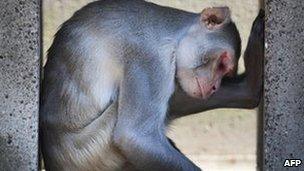US scientists' trial brings them 'closer to Ebola drug'
- Published
A drug to treat the Ebola virus is reported to be one step closer after US scientists were given permission to conduct human trials.

The new drug cured Ebola in 60% of rhesus monkeys tested
Clinical trials have been approved after a new drug was proven to be effective on monkeys.
Ebola causes death in 90% of human cases, but is always fatal to apes.
Around 1,200 people have died of the disease since 1976, but it is feared that it could be used as a bioweapon by terrorists.
Ebola is transmitted via bodily fluids. Sufferers experience nausea, vomiting, internal bleeding and organ failure before they die.
In the latest tests, scientists found that the new drug cured the virus in 60% of rhesus monkeys.
It proved 100% effective in treating the closely-related Marburg virus in cynomolgus monkeys.
The US Food and Drug Administration has now given permission for trials involving a small group of human volunteers.
Ebola's high mortality rate has fuelled fears that it could be used in bio terrorism and funding into research for a treatment was increased in the US after the September 11th attacks in 2001.
The new treatment is being developed jointly by the US Army Medical Research Institute of Infectious Diseases and private company AVI BioPharma.
However scientists caution that despite the apparent progress, a full vaccine will take time to develop with more extensive trials and assessment needed.